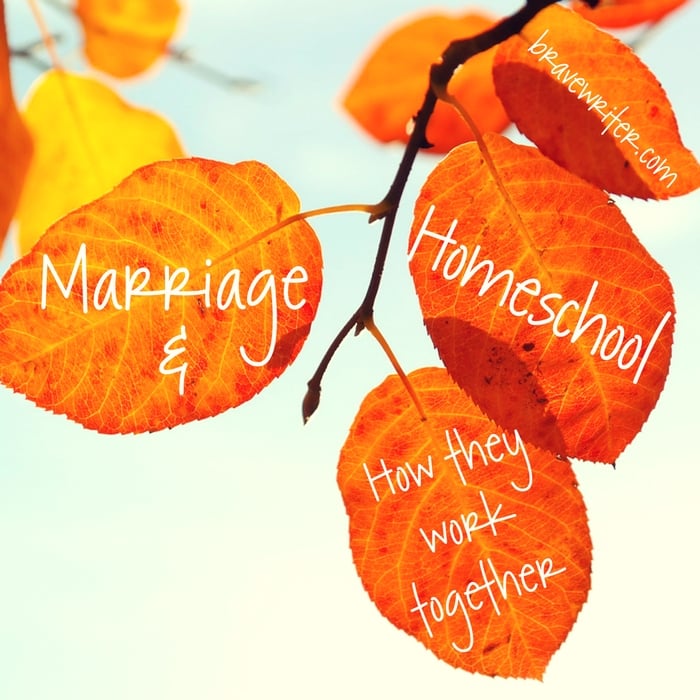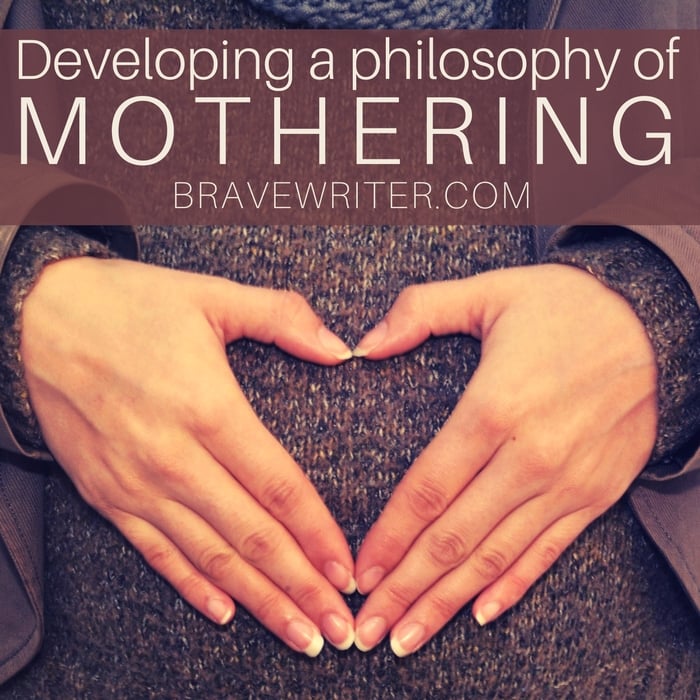
We’ve talked about the rosy sides of parenting, when life is a swirl of activity and spilled orange juice, and the greatest problems seem to be syncing up naptimes between babies and toddlers or figuring out when to take the 15 year old to a parking lot to learn to drive. Slowing down to savor the intentional educational and sentimental moments helps a lot in this context to keep you on track both emotionally and practically.
But what about when there are added stresses?
I spoke at a local homeschool group this past February. As I explained how the Brave Writer philosophy worked (our non-workbook approach to things like spelling and grammar, the freedom in writing without a systematic schedule, fewer writing projects with more revisions), one mom raised her hand. She asked, “How can I get my husband to accept this? He really wants proof that we are doing school and I don’t think he’ll accept this idea.”
My initial reaction startled her: “I don’t know your husband. So I don’t know if he’s a control freak or a nice guy you can talk to about stuff that matters to you and he’ll listen.”
She laughed nervously. I continued.
“See, I don’t know your dynamic together. I imagine he’s a nice guy and if so, appeal to his desire to trust home education to you. Share materials, send him to my website, suggest he read The Writer’s Jungle, if he’s really concerned. That said, if he’s a controller, none of that will work.”
We moved on because I’m in the writing business, not marriage counseling. Still, this is not an infrequent question and it’s a part of a larger context of difficulty in home education. I can’t help your marriage or partnership. But I can talk about the stress that relationship issues create for you and what to do when homeschooling.
Marriage:
Home education is unique in that it requires total responsibility taken by parents. My sister-in-law, who home educated her six kids, once said to me that she never needed to give her kids tests because whoever met them, tested them for her. Somehow relatives and friends would hear that one of her kids had never been to school and semi-interested person would say, “What’s 8 x 15?” to see if her child knew anything. This random act of standardized testing is annoying, to say the least. Our pediatricians, aunts, next door neighbors and even swim team coaches will give the pop quiz to our kids. It makes us nervous!
When school kids don’t know something, parents (as a rule) blame teachers, curricula, the child’s laziness, the flu, too much attention to soccer, ADD, allergies and so on. You rarely hear a parent of a schooled child say, “My kid is failing math and I wish I knew what I was doing wrong.” When homeschooled kids don’t know something, it’s me. It’s you. And by extension, it is also the non-home educating parent. We immediately feel it’s our choice of curricula, our failed methods of teaching, our lack of insight into learning style, our child’s learning disability we have yet to detect. We feel the full weight of responsibility.
That responsibility is even more difficult to manage when you’re not directly in charge of the decision-making. A parent who is not home to see you agonizing over websites, poring through borrowed materials from friends, and listening to your conversations at the park, may have a truncated view of how much education is happening in your home. If you have a relaxed learning style with your kids and your partner is a Type A “show me the results” kind of person, tension over what is the right way to home educate is likely.
Homeschool is deeply knitted to the atmosphere of the family and the marriage dynamic. A supportive context is essential for your kids. They make the most progress in their education when parents are on the same page because then the home educator isn’t trying to please someone else’s idea of learning even while secretly distrusting it. The best ways to foster this kind of shared philosophy are as diverse as healthy marriages. Letting one person be fully in charge while the other gives lots of compliments, all the way to reading everything together and discussing until consensus is reached are two ends of the continuum.
Problems arise when one person has the responsibility
and the other person has the control.
That’s when homeschooling becomes a battleground in a marriage. (Pssst. It’s usually not the only battleground in the marriage, either.)
It’s very hard to home educate when you’re pressured to perform a philosophy of education you don’t hold. It’s very hard to generate good feeling, hope, optimism and attentiveness to your children’s specific interests and needs if you’re afraid that you’ll “get in trouble” for the methods you use to meet those needs. Typically we pass stress along. So if you feel stressed by the pressure your spouse puts on you to “perform,” you’ll transfer that stress to your kids. You’ll do it if you feel pressure from any source (your mom, your mother-in-law or the ghost of public school past that still haunts your imagination!).
If that unwieldy pressure comes from the person you rely on to be your biggest support, your closest confidant, and best friend, the level of disquiet you carry will be substantial, and naturally will transfer to the kids. It matters that you take seriously your level of stress, anxiety, and feelings of pressure.
If the usual methods of problem solving don’t work between you and your spouse, it’s time to get help. Don’t wait. Your kids live in the atmosphere created all day long. Compromise is a normal part of marriage. Capitulation is not the same thing, and it leads to resentment.
If you truly can’t get to the same page philosophically after exhausting all the methods of conflict resolution, you may have to consider that homeschooling is not for you or for your kids. It may mean that your marriage is not capable of supporting the demands of home education. If that’s true, it’s okay. Peace in the family is more important than homeschooling.




















